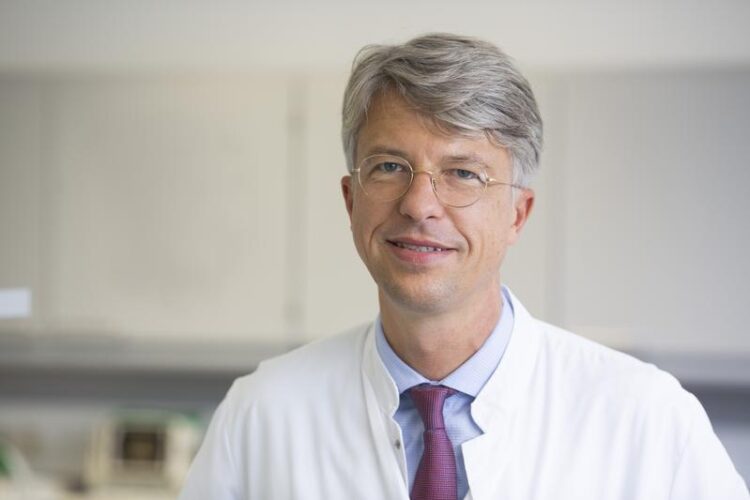Researching a new treatment option for severe blood disorders of the bone marrow

Prof. Dr. med. Uwe Platzbecker
Foto: Stefan Straube / UKL
When people develop myelodysplastic neoplasms (MDS), the healthy maturation of blood cells is impaired. Severe forms, known as higher-risk MDS, are characterised by rapid progression, severe symptoms and often a transition to acute leukaemia. Patients for whom potentially curative or intensive treatments, such as stem cell transplantation or high-dose chemotherapy, are not suitable, have very few alternative treatment options. An international clinical trial led by Professor Uwe Platzbecker from the University of Leipzig Medical Center, in collaboration with a large international team of researchers, tested a new treatment combination.
Every year, around 4,000 people in Germany are diagnosed with myelodysplastic neoplasms (MDS). The disease can lead to anaemia, infections and an increased risk of bleeding. People with higher-risk MDS have a significantly lower life expectancy than the average person of the same age. In the higher-risk stage, the disease is treated with stem cell transplantation or chemotherapy. Patients for whom these intensive and physically demanding treatments are not an option, have very few therapeutic alternatives. Therefore, there is a great need for new approaches and combinations in higher-risk MDS.
In a current international trial at 54 sites in 17 countries, researchers tested a new treatment combination in 127 patients. Hypomethylating agents (HMA), the current standard of care in this patient population, were compared with a combination of HMA and the active ingredient sabatolimab. Sabatolimab is an intravenously administered new immunotherapeutic agent that targets domains located on myeloid immune and tumour cells. It belongs to a class of drugs known as immune checkpoint inhibitors. Checkpoint inhibitors target specific areas of the immune system to override tumour survival mechanisms.
This could prevent the cancer from switching off the immune system that would otherwise attack it. “The study is the first randomised trial involving immunotherapy in combination with the standard of care in this patient population for myeloid neoplasms,” says Uwe Platzbecker, Professor of Haematology at Leipzig University and Director of the Department for Hematology, Cell Therapy, Hemostaseology and Infectious Diseases at the University of Leipzig Medical Center. Professor Platzbecker has been conducting clinical research into myelodysplastic neoplasms for more than 20 years.
The addition of the active ingredient sabatolimab to the standard of care did not significantly improve response rates or progression-free survival in this study. However, in most cases, sabatolimab showed a manageable safety profile in this difficult-to-treat patient population for whom only limited treatment options are available. The most common side effects were a reduction in white blood cells (neutropenia) and platelets (thrombocytopenia) – although these occurred in both the sabatolimab and placebo groups.
The researchers still see potential in combining the standard treatment with the new active ingredient sabatolimab. A randomised phase 3 trial is already underway. Phase 3 trials are the final stage of drug development and test new treatment options in large patient cohorts. This follow-up study is investigating the potential benefit – in terms of overall patient survival – of sabatolimab in combination with azacitidine, the most commonly used HMA. The clinical trial described above was sponsored by the pharmaceutical company Novartis.
Wissenschaftliche Ansprechpartner:
Professor Uwe Platzbecker
Director of the Department for Hematology, Cell Therapy, Hemostaseology and Infectious Diseases
Professor of Haematology, Leipzig University
Tel: +49 341 97 13 050
Email: Uwe.Platzbecker@medizin.uni-leipzig.de
Originalpublikation:
Sabatolimab plus hypomethylating agents in previously untreated patients with higher-risk myelodysplastic syndromes (STIMULUS-MDS1): a randomised, double-blind, placebo-controlled, phase 2 trial. https://doi.org/10.1016/S2352-3026(23)00333-2
Media Contact
All latest news from the category: Health and Medicine
This subject area encompasses research and studies in the field of human medicine.
Among the wide-ranging list of topics covered here are anesthesiology, anatomy, surgery, human genetics, hygiene and environmental medicine, internal medicine, neurology, pharmacology, physiology, urology and dental medicine.
Newest articles

First-ever combined heart pump and pig kidney transplant
…gives new hope to patient with terminal illness. Surgeons at NYU Langone Health performed the first-ever combined mechanical heart pump and gene-edited pig kidney transplant surgery in a 54-year-old woman…

Biophysics: Testing how well biomarkers work
LMU researchers have developed a method to determine how reliably target proteins can be labeled using super-resolution fluorescence microscopy. Modern microscopy techniques make it possible to examine the inner workings…

Making diamonds at ambient pressure
Scientists develop novel liquid metal alloy system to synthesize diamond under moderate conditions. Did you know that 99% of synthetic diamonds are currently produced using high-pressure and high-temperature (HPHT) methods?[2]…





















